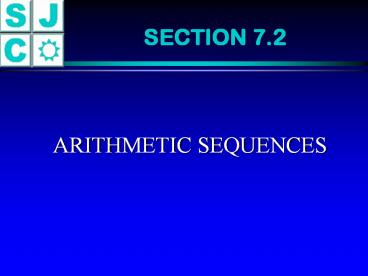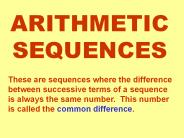ARITHMETIC SEQUENCES - PowerPoint PPT Presentation
1 / 16
Title:
ARITHMETIC SEQUENCES
Description:
section 7.2 arithmetic sequences arithmetic sequences arithmetic sequence recursion formula example: arithmetic sequence explicit formula arithmetic sequence explicit ... – PowerPoint PPT presentation
Number of Views:165
Avg rating:3.0/5.0
Title: ARITHMETIC SEQUENCES
1
SECTION 7.2
ARITHMETIC SEQUENCES
2
ARITHMETIC SEQUENCES
(a) 5, 9, 13, 17,
21,
25
Adding 4 Adding .5 Adding - 3
(b) 2, 2.5, 3, 3.5,
4,
4.5
(c) 8, 5, 2, - 1,
- 4,
- 7
Arithmetic Sequences have a common
difference. (a) 4 (b) .5 (c) - 3
3
ARITHMETIC SEQUENCE RECURSION FORMULA
a n a n - 1 d This formula relates each term
in the sequence to the previous term in the
sequence. a n a n - 1 4 b n b n - 1
.5 c n c n - 1 - 3
4
EXAMPLE
Given that e 1 4 and the recursion formula e n
e n - 1 0.3, determine the first five terms
of the sequence e n .
e 1 4
e 2 4 .3 4.3
e 3 4.3 .3 4.6
e 4 4.6 .3 4.9
e 5 4.9 .3 5.2
5
Recursion Formulas have a big disadvantage. In
the last example, what would happen if we needed
to know the value of the 291st term? Explicit
Formulas are much better for finding nth terms.
6
ARITHMETIC SEQUENCE EXPLICIT FORMULA
3 ds
n-1 ds
2 ds
d
1 d
d
d
d
d
d
d
a1
a1
a1
a1
a1
a 1
a 2
a 3
a 4
a n
7
ARITHMETIC SEQUENCE EXPLICIT FORMULA
a n a 1 (n - 1) d Example Determine e 291
for the arithmetic sequence with e1 4 and
common difference d 0.3 e 291 4 (291 - 1)
(0.3) 91
8
SUMS OF ARITHMETIC SEQUENCES
1 2 . . . 49 50 51 52 . . . 99
100
50 PAIRS OF 101 50(101) 5050
9
ARITHMETIC SEQUENCE SUM FORMULA
The sum of n terms of an arithmetic sequence is n
times the average of the first and last terms to
be added.
10
EXAMPLE
Determine the sum of the first 200 terms of the
arithmetic sequence a n with a 1 - 5 and d
3. First, we must find a 200 a 200 - 5
(199)(3) 592
11
EXAMPLE
a 1 - 5 and a 200 592
58, 700
12
FINDING THE NUMBER OF TERMS IN A SEQUENCE
4, 9, 14, 19, . . . , 64 Just add 5 on the
calculator until you get to 64 and see how many
terms there are in the sequence. OR
13
FINDING THE NUMBER OF A TERMS IN A SEQUENCE
14
EXAMPLE
(2 - 1) (4 - 1) (6 - 1) . . . (100 - 1)
1 3 5 . . .
99 This is the sum of an arithmetic sequence
15
EXAMPLE
1 3 5 . . . 99
16
- CONCLUSION OF SECTION 7.2































